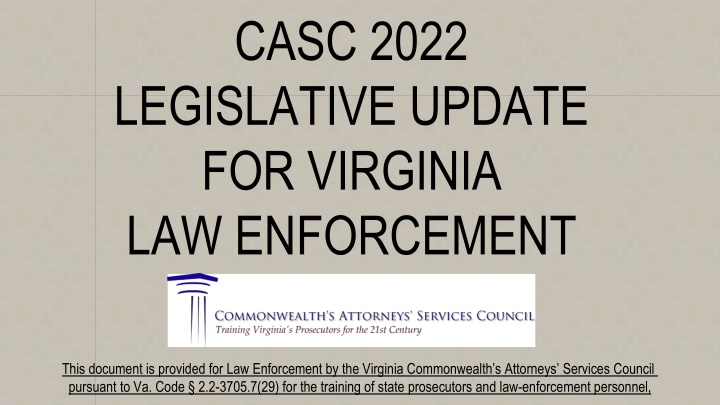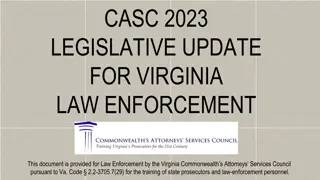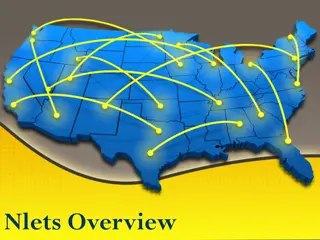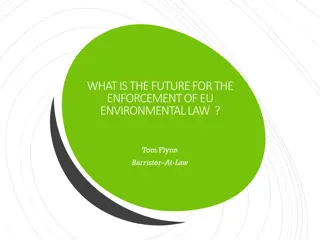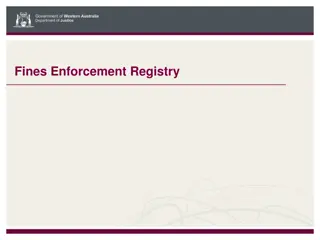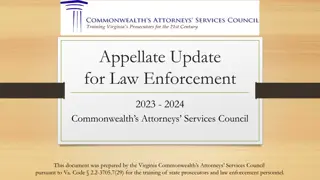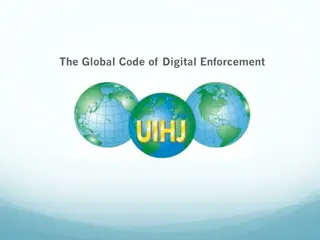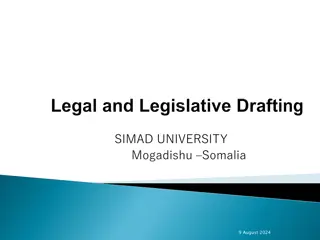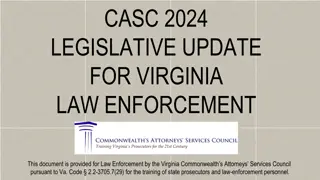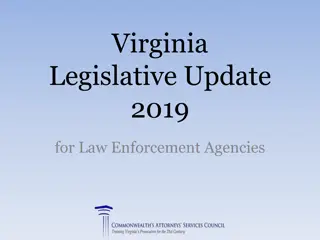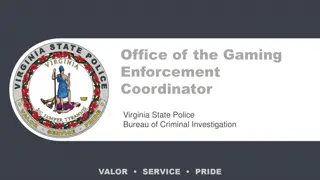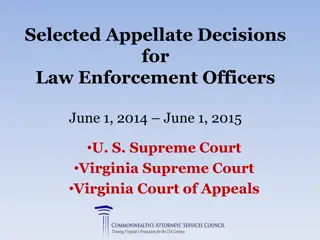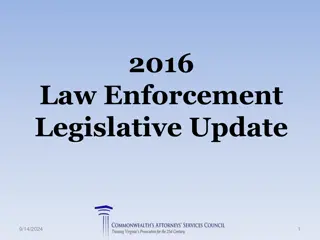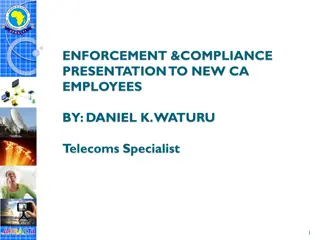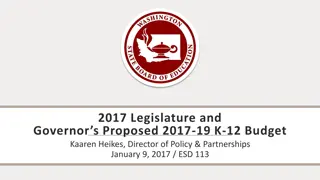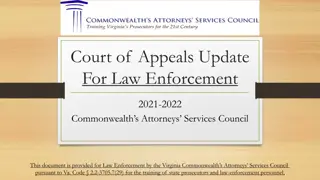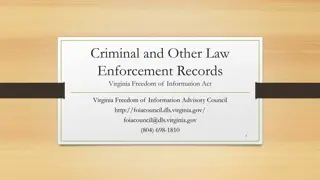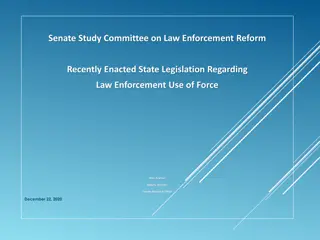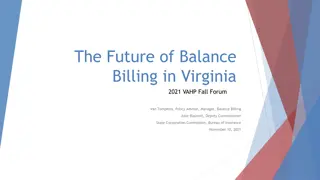Virginia Law Enforcement: 2022 Legislative Update Highlights
Explore the key legislative updates impacting Virginia law enforcement in 2022, covering criminal investigations, procedures, new offenses, marijuana regulations, and more. Stay informed on changes regarding investigative processes, law enforcement technology use, and procedural guarantees, with effective dates of July 1, 2022. Dive into details on amendments, new laws, and repealed offenses to enhance understanding and compliance within the legal framework.
Download Presentation

Please find below an Image/Link to download the presentation.
The content on the website is provided AS IS for your information and personal use only. It may not be sold, licensed, or shared on other websites without obtaining consent from the author.If you encounter any issues during the download, it is possible that the publisher has removed the file from their server.
You are allowed to download the files provided on this website for personal or commercial use, subject to the condition that they are used lawfully. All files are the property of their respective owners.
The content on the website is provided AS IS for your information and personal use only. It may not be sold, licensed, or shared on other websites without obtaining consent from the author.
E N D
Presentation Transcript
CASC 2022 LEGISLATIVE UPDATE FOR VIRGINIA LAW ENFORCEMENT This document is provided for Law Enforcement by the Virginia Commonwealth s Attorneys Services Council pursuant to Va. Code 2.2-3705.7(29) for the training of state prosecutors and law-enforcement personnel,
Materials This PowerPoint attempts to identify the legislation from the 2022 General Assembly Regular Session that has the greatest impact on law enforcement and public safety. Consult the 2022 Legislative Update Master List outline for full listing of bills of interest. This presentation will NOT cover every bill.
Materials You must rely only upon the final language of the bill after passage. Slides summarize each bill, but you should read the actual law before acting. You can find the bill on the LIS website at: http://lis.virginia.gov/lis.htm.
Topics for this Presentation Criminal Investigations Criminal Procedure New Crimes and Offenses Amended Offenses Repealed Offenses Marijuana New Regulations & Requirements ECO and TDO Detention FOIA and Law Enforcement Records Law Enforcement Procedural Guarantees
Note: Effective Date of Legislation All legislation from the Special Session, unless otherwise noted in this presentation, is effective on July 1, 2022.
Service of Process by C/W Investigator Ch. 248 / 684: 8.01-293 amended to provide that all investigators employed by an attorney for the Commonwealth or by the Indigent Defense Commission while engaged in the performance of their official duties when serving witness subpoenas shall not be considered a party or otherwise interested in the subject matter in controversy and, thus, are authorized to serve process to such witnesses.
Ch. 737: Facial Recognition Technology Amends 15.2-1723.2 and 23.1-815.1 and adds 52-4.5 Authorizes local law-enforcement agencies, campus police departments, and the Department of State Police (the Department) to use facial recognition technology for certain authorized uses as defined in the bill. The bill requires that the appropriate facial recognition technology be determined by the Division of Purchases and Supply and that such facial recognition technology be evaluated by the National Institute of Standards and Technology and have an accuracy score of at least 98 percent true positives across all demographic groups.
What is Facial Recognition Technology ? Facial recognition technology" means an electronic system for enrolling, capturing, extracting, comparing, and matching an individual's geometric facial data to identify individuals in photos, videos, or real time. "Facial recognition technology" does not include the use of an automated or semi-automated process to redact a recording in order to protect the privacy of a subject depicted in the recording prior to release or disclosure of the recording outside of the law-enforcement agency if the process does not generate or result in the retention of any biometric data or surveillance information.
Ch. 737 Cond The bill directs the Department to develop a model policy regarding the investigative uses of facial recognition technology, including training requirements and protocols for handling requests for assistance in the use of facial recognition technology made to the Department by local law-enforcement agencies and campus police departments, to be posted publicly no later than January 1, 2023, and requires local law- enforcement agencies or campus police departments that use facial recognition technology to either adopt the Department's model policy or develop an individual policy that meets or exceeds the standards set by the Department's model policy.
Ch. 737 Cond The bill directs local law-enforcement agencies, campus police departments, and the Department to collect and maintain certain data related to the use of facial recognition technology and to publish an annual report to provide information to the public regarding the agency's use of facial recognition technology.
Ch. 737 Cond The bill clarifies that any match made through facial recognition technology shall not be used in an affidavit to establish probable cause for the purposes of a search or arrest warrant. Additionally, any facial recognition technology operator employed by a local law-enforcement agency, campus police department, or the Department who violates the agency's or department's policy for the use of facial recognition technology or conducts a search for any reason other than those authorized by the bill is guilty of a Class 3 misdemeanor for a first offense, and is guilty of a Class 1 misdemeanor for a second or subsequent offense. The provisions of this act shall expire on July 1, 2026.
Ch. 394 / 395: Critically Missing Adult Expands the definition of "critically missing adult" in 15.2-1718.2 and 52-34.10 to include any missing adult, including an adult who has a developmental disability, intellectual disability, or mental illness, 18 years of age or older for the purpose of receipt of critically missing adult reports by a police or sheriff's department and the Virginia Critically Missing Adult Alert Program administered by the Department of State Police and removes from the Program the eligibility requirement that the adult is believed to have been abducted.
Marcus Alert: Special Session: Va. Code 9.1-193 July 1: Department of Behavioral Health and Developmental Services (DBHDS) shall have a plan for a Marcus Alert system. A specialized response by law enforcement designed to meet the goals set forth in this article to ensure that individuals experiencing a mental health, substance abuse, or developmental disability-related behavioral health crisis receive a specialized response when diversion to the comprehensive crisis system is not feasible.
2022: Ch. 613 / 619: Change in Participation Requirements Extends the date by which localities shall establish voluntary databases to be made available to the 911 alert system and the Marcus alert system to provide relevant mental health information and emergency contact information for appropriate response to an emergency or crisis from July 1, 2021, to July 1, 2023, Provides an exemption to the requirement that localities establish protocols for local law-enforcement agencies to enter into memorandums of agreement with mobile crisis response providers regarding requests for law-enforcement back-up during mobile crisis or community care team response and minimum standards, best practices, and a system for the review and approval of protocols for law-enforcement participation in the Marcus alert system for localities with a population that is less than or equal to 40,000, so that localities with a population that is less than or equal to 40,000 may but are not required to establish such protocols.
Ch. 403: Search Warrants Bill clarifies that, under 19.2-56, if the owner of the place to be searched is not present, a copy of the search warrant and affidavit shall be given to at least one adult occupant of the place to be searched. Previously, the law stated any occupant, which could mean all occupants.
Ch. 542: Juvenile law-enforcement records; disclosures to school principals. Changes 16.1-301 from discretionary to mandatory that the chief of police of a city or chief of police or sheriff of a county disclose to a school principal all instances where a juvenile at the principal's school has been charged with a violent juvenile felony, an arson offense, or a concealed weapon offense Adds an offense that requires a juvenile intake officer to make a report with the school division superintendent to the list of such instances that must be disclosed to a school principal for the protection of the juvenile, his fellow students, and school personnel.
Ch. 793/794 School Principals & Incident Reports Amends 8.01-47, 22.1-279.3:1, and 22.1-279.3:3 to require that school principals report to law enforcement certain enumerated acts that may constitute a misdemeanor offense and report to the parents of any minor student who is the specific object of such act that the incident has been reported to law enforcement. Under current law, principals are required to make such reports only for such acts that may constitute a felony offense. The bill provides, as an exception to the requirement to report any written threats against school personnel while on a school bus, on school property, or at a school- sponsored activity, that a principal is not required but may report to the local law- enforcement agency any such incident committed by a student who has an individualized education plan.
Ch. 743: APS Investigations & Financial Records Amends 63.2-1606 and adds 6.2-103.1 to require financial institutions to cooperate in any investigation of alleged adult abuse, neglect, or exploitation conducted by a local department of social services and to make any financial records or information relevant to such investigation available to the local department of social services upon request. Financial institutions may also voluntarily report information relevant to an adult protective services investigation to the local department of social services or to a court-appointed guardian ad litem for the adult under investigation. The bill provides that, absent gross negligence or willful misconduct, a financial institution is immune from civil or criminal liability for providing such information to a local department of social services or a court-appointed guardian ad litem.
Ch. 326: Offenses During Close Pursuit 19.2-77 amended to provide that if a law-enforcement officer makes an arrest without a warrant when in close pursuit and such arrest is made beyond the boundary of the county or city from which the arrestee fled, then the law- enforcement officer shall procure a warrant from the magistrate serving the county or city wherein the arrest was made, charging the accused with the offense committed in the county or city from which he fled and any offense committed during the close pursuit in the county or city where such offense was committed. Under existing law, such officer would not be able to obtain a warrant from the magistrate serving the county or city wherein the arrest was made for a criminal act committed during the close pursuit beyond the boundary of the county or city from which the arrestee fled.
Hope Card Program Ch. 374 requires the Office of the Executive Secretary of the Supreme Court of Virginia to develop and all district courts and circuit courts to implement the Hope Card Program (the Program) for the issuance of a Hope Card to any person who has been issued a permanent protective order by any district court or circuit court. Bill provides that a Hope Card issued pursuant to the Program shall be a durable, plastic, wallet-sized card containing, to the extent possible, essential information about the protective order, such as the identifying information and characteristics of the person subject to the protective order, the issuance and expiration date of the protective order, the terms of the protective order, and the names of any other persons protected by the protective order.
Ch. 508: Disposition when defendant found incompetent; involuntary admission of the defendant. Amends 19.2-169.1 and 19.2-169.2 to provide that in cases where the defendant has been charged with a misdemeanor larceny-related offense or a misdemeanor offense for trespassing, destruction of property, intoxication in public, disorderly conduct, or failure to appear and is found to be incompetent following a competency evaluation, the competency report may recommend that the court direct the community services board or behavioral health authority to i. conduct an evaluation to determine whether the defendant meets the criteria for temporary detention and ii. upon determining that the defendant does meet the criteria for temporary detention, file a petition for issuance of an order for temporary detention of the defendant.
Ch. 508 cond Similarly, the bill provides that, in cases in which a defendant has been charged with one of the listed misdemeanors, is found to be incompetent, and the competency report recommends that the defendant be temporarily detained, the court may dismiss the charges without prejudice and, in lieu of ordering that the defendant receive treatment to restore his competency, order the community services board or behavioral health authority to conduct an evaluation of the defendant and if the board or authority determines that the defendant meets the criteria for temporary detention, file a petition for issuance of an order for temporary detention.
Ch. 508 cond The bill provides that the court shall not dismiss such charges and enter such order if the attorney for the Commonwealth is involved in the prosecution of the case and does not concur in the motion. Under existing law, the court is required to order that the defendant receive treatment to restore his competency. The bill also clarifies the process following the completion of the competency evaluation of a defendant. The bill has an expiration date of July 1, 2023.
Ch. 614 - Vicious dogs. Amends 3.2-6540.1 and 3.2-6569 to require that a law-enforcement officer or animal control officer apply to a magistrate for a summons for a vicious dog if such officer is located in either the jurisdiction where the vicious dog resides or in the jurisdiction where the vicious dog committed one of the acts set forth in the definition of a vicious dog. Existing law requires such action only if the law-enforcement officer or animal control officer is located in the jurisdiction where the vicious dog resides. The bill also requires any evidentiary hearing or appeal to be held not less than 30 days from the date of the summons or appeal, unless good cause is found by the court.
Budget Bill HB 30 Item 404 The bill provides that Notwithstanding the provisions of 53.1-202.3, Code of Virginia, a maximum of 4.5 sentence credits may be earned for each 30 days served on a sentence that is concurrent with or consecutive to a sentence for a conviction of an offense enumerated in subsection A of 53.1-202.3, Code of Virginia. The Governor signed this provision on June 22, 2022
NEW AND AMENDED CRIMES AND OFFENSES
Ch. 594: Sexual Abuse of Animals: New offense, 18.2-361.01 Provides that any person who knowingly engages in sexual contact with an animal; causes another person by force, threat, or intimidation to engage in sexual contact with an animal; advertises, solicits, offers, sells, purchases, or possesses an animal with the intent that the animal be subject to sexual contact; permits sexual contact with an animal to be conducted on any premises under his ownership or control; or produces, distributes, publishes, sells, transmits, finances, possesses, or possesses with the intent to distribute, publish, sell, or transmit an obscene item depicting a person engaged in sexual contact with an animal is guilty of a Class 6 felony. i. ii. iii. iv. v.
Ch. 594 Cond The bill also provides that any person convicted of sexual abuse of an animal shall be prohibited from possessing, owning, or exercising control over any animal and may be ordered to attend an appropriate treatment program or obtain psychiatric or psychological counseling.
Ch. 664 / 665 Catalytic Converters Amends 18.2-146 to make it a Class 6 felony for a person to willfully break, injure, tamper with, or remove any part or parts of any vehicle, aircraft, boat, or vessel for the purpose of injuring, defacing, or destroying said vehicle, aircraft, boat, or vessel, or temporarily or permanently preventing its useful operation, or for any purpose against the will or without the consent of the owner, or to in any other manner willfully or maliciously interfere with or prevent the running or operation of such vehicle, aircraft, boat, or vessel, when such violation involves the breaking, injuring, tampering with, or removal of a catalytic converter or the parts thereof. The bill also provides that prosecution for such felony is a bar to a prosecution or proceeding under the Code section prohibiting the injuring, etc., of any property, monument, etc., for the same act. Existing law makes such violation a Class 1 misdemeanor.
Ch. 664 / 665 Cond Additionally, the bill requires that the copies of the documentation that scrap metal purchasers are required to maintain for purchases of catalytic converters or the parts thereof i. establish that the person from whom they purchased the catalytic converter or the parts thereof had lawful possession of it at the time of sale or delivery and ii. detail the scrap metal purchaser's diligent inquiry into whether the person selling had a legal right to do so. The bill also requires that such documentation be maintained for at least two years after the purchase and that copies be made available upon request to any law-enforcement officer, conservator of the peace, or special conservator of the peace in the performance of his duties who presents his credentials at the scrap metal purchaser's normal business location during normal business hours.
Ch. 673 / 674 Creates new offense, 18.2-473.2, which provides that any person who intentionally covers, removes, damages, renders inoperable, or otherwise obscures a security camera, as defined in the bill, without the permission of the sheriff, jail superintendent, warden, or Director of the Department of Corrections or Department of Juvenile Justice is guilty of a Class 1 misdemeanor. The bill also provides that any person who intentionally covers, removes, damages, renders inoperable, or otherwise obscures a security camera with the intent of inhibiting or preventing a security camera from recording or transmitting a photograph, motion picture, or other digital image of the commission of a felony is guilty of a Class 6 felony.
Ch. 259/642: Adult Abuse and Neglect 18.2-178.1 changes the term "incapacitated adult" to "vulnerable adult" for the purposes of the crime of abuse and neglect of such adults Defines "vulnerable adult" as any person 18 years of age or older who is impaired by reason of mental illness, intellectual or developmental disability, physical illness or disability, or other causes, including age, to the extent the adult lacks sufficient understanding or capacity to make, communicate, or carry out reasonable decisions concerning his well-being or has one or more limitations that substantially impair the adult's ability to independently provide for his daily needs or safeguard his person, property, or legal interests. Bill also changes the term "person with mental incapacity" to the same meaning of "vulnerable adult" for the purposes of the crime of financial exploitation.
Ch. 397 / 654: Misuse of Power of Attorney New Code Section 18.2-178.2 makes it a Class 1 misdemeanor for an agent under a power of attorney to knowingly or intentionally engage in financial exploitation of an incapacitated adult who is the principal of that agent. One issue: New law relies on definition of incapacitated adult that previous bill, Ch. 259/642, eliminated effective July 1. Bill also provides that the agent's authority terminates upon such conviction.
Contributing: Statute of Limitations Ch. 110: 19.2-8 amended RE: prosecution of the misdemeanor offense of causing or encouraging acts rendering children delinquent where the alleged adult offender has consensual sexual intercourse with a minor who is 15 years of age or older at the time of the offense After July 1: Prosecution shall be commenced no later than five years after the victim reaches majority provided that the alleged adult offender was more than three years older than the victim at the time of the offense. Under existing law, the prosecution of such offense shall be commenced within one year after commission of the offense.
Ch. 276: Stalking Venue 18.2-60.3 amended to allow a person to be prosecuted for a stalking charge in the jurisdiction where the person resided at the time of such stalking. The bill also provides that evidence of any conduct that occurred outside the Commonwealth may be admissible, if relevant, in any prosecution for stalking. Currently, such evidence is admissible as long as the prosecution is based upon conduct occurring within the Commonwealth.
Ch. 645: Definition of Intimate Parts Includes in the definition of "intimate parts in 18.2-67.10 for the purposes of criminal sexual assault, the chest of a child under the age of 15.
Ch. 651: Hunting with Dogs Adds new code section, 29.1-516.2, that requires that any dog engaged in lawful hunting wear a substantial collar with a tag attached that identifies the name of the owner or custodian of the dog and a current phone number.
Ch. 31: Front and rear bumper height limits 46.2-1063: Amended to state: No passenger car or pickup or panel truck shall be operated on a public highway if the suspension, frame, or chassis has been modified by any means so as to cause the height of the front bumper to be four or more inches greater than the height of the rear bumper. Change took effect immediately
Ch. 51 / 52: Farm Use Tags Amends 46.2-665, 46.2-666, 46.2-670, 46.2-672, and 46.2-673 and adds 46.2-684.2 Change will require an owner or lessee of a vehicle claiming a farm use exemption from the registration, licensing, and decal requirements for a motor vehicle, trailer, or semitrailer to obtain a nontransferable permanent farm use placard from the Department of Motor Vehicles and to display the farm use placard on the vehicle at all times. Law requires the applicant to provide specified information about the vehicle and its usage, pay a $15 fee, and certify that the vehicle is insured. Provisions of the bill requiring the owner or lessee of a farm vehicle to obtain and display a farm use placard have a delayed effective date of July 1, 2023.
Ch. 736: Exempted vehicles; insurance. Amends 46.2-684.1 to require motor vehicles, trailers, and semi- trailers exempted from the registration requirement to be covered by motor vehicle insurance; a general liability policy; or an umbrella or excess insurance policy. The bill requires the owner of any such motor vehicle, trailer, or semi- trailer to provide proof of insurance within 30 days when requested by a law-enforcement officer and provides that failure to do so is punishable as a traffic infraction by a fine of $600 to be paid into the Uninsured Motorists Fund.
Ch. 758: Parking in Electric Vehicle Charging Spots Creates new code section, 46.2-1219.3, that prohibits a person from parking a vehicle not capable of receiving an electric charge or not in the process of charging in a space clearly marked as reserved for charging electric vehicles. A violation is subject to a civil penalty of no more than $25.
Bicycles 2021 Changes In 2021, General Assembly added requirement in 46.2-839 that, if the lane of travel is not wide enough to allow an overtaking motor vehicle to pass at least three feet to the left while in the same lane as the overtaken bicycle, electric personal assistive mobility device, electric power-assisted bicycle, moped, animal, or animal-drawn vehicle, the overtaking vehicle shall change lanes. In 2021, General Assembly also repealed rule (in 46.2-905) that persons riding two abreast bicycles, electric personal assistive mobility devices, electric power- assisted bicycles, or motorized skateboards or scooters on a highway shall not impede the normal and reasonable movement of traffic, shall move into a single file formation as quickly as is practicable when being overtaken from the rear by a faster moving vehicle, and, on a laned roadway, shall ride in a single lane.
Ch.341: Bicycles Riding Two Abreast In 2022, General Assembly amended 46.2-905 again, this time to prohibit persons riding bicycles, electric personal assistive mobility devices, electric power-assisted bicycles, or motorized skateboards or scooters two abreast from impeding the normal and reasonable movement of traffic 46.2-905 will also now require such persons to move into a single-file formation as quickly as is practicable when being overtaken from the rear by a faster-moving vehicle.
Ch. 490: Exhaust systems; excessive noise. Amends 46.2-1049 so that offenses related to loud exhaust systems that are not in good working order are primary offenses. Reverses 2020 Special Session amendment, which had made such offenses secondary offenses. Amends 46.2-1051 so that local ordinances related to such exhaust systems are exempt from the prohibition on law-enforcement officers stopping a vehicle for a violation of a local ordinance unless it is a jailable offense.
Mopeds, Motorcycles, etc. 2020 Special Session also prohibited localities from enacting ordinances that allowed police to stop based on noise from a motorcycle, moped, or motorized skateboard or scooter, which is not equipped with a muffler and exhaust system Ch. 490 also eliminated that prohibition. Localities now may create their own ordinances and permit stops to regulate noise from a vehicle operated on a highway that is not equipped with a muffler and exhaust system conforming to 46.2- 1047 and 46.2-1049.
Ch. 506 / 507: Careless Driving & Vulnerable Road Users. Amends 46.2-392 and 46.2-816.1 so that a person is guilty of a Class 1 misdemeanor if he operates a vehicle in a careless or distracted manner and causes the death or serious bodily injury of a vulnerable road user. Existing law only imposes the penalty if such careless or distracted operation causes serious bodily injury to the vulnerable road user. The bill also allows a court to suspend the driver's license or restrict the driver's license of a person convicted of careless driving for up to six months.
